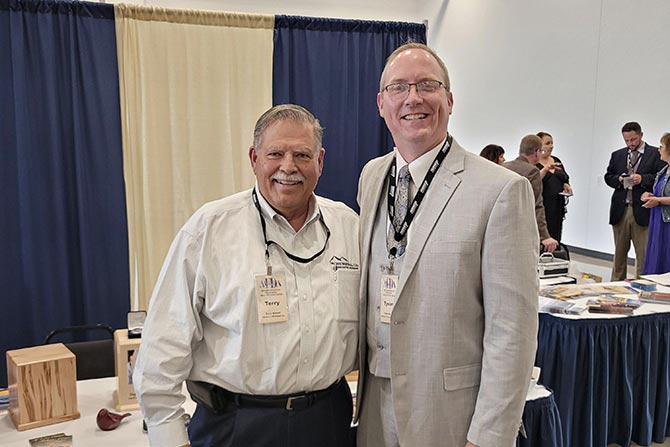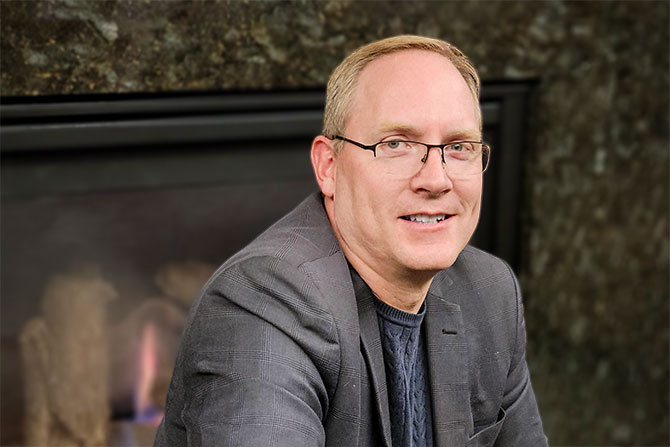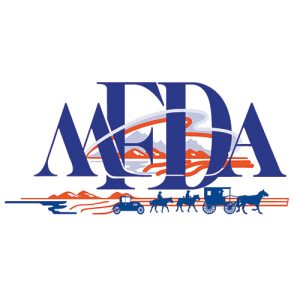Tyson Moore is a Licensed Funeral Director and General Manager at Garden City Funeral Home and Crematory. He also oversees the day-to-day operations of five Western Montana firms. Tyson has been serving the Missoula community for over 10 years. Before moving to Montana, he lived in Colorado, where he and his family owned and operated a monument sales and manufacturing company serving Colorado, Nebraska and Wyoming families. He has also worked on memorial projects throughout the United States. His largest project to date is the Korean War Memorial for the State of New Jersey, located on the boardwalk in Atlantic City.
His time away from the funeral home is spent with his wife and five children, along with Frasier, the therapy dog he brings to the funeral home. He is also quite active with his church community.
We recently sat down with Tyson and got to know more about him, his work life and his thoughts on the funeral service industry. The following are excerpts from our conversation. We hope you enjoy getting to know him as much as we did.
What are the two or three biggest issues facing the funeral industry?
I think the biggest issue that the industry is facing is recruitment. It is difficult to attract young talent to an industry with irregular hours that demands so much emotionally. The younger generation likes to have flexibility. With a degree in finance, one can work in retail, banking, etc. Other degree areas are similar, which lends itself to being able to change workplaces and careers over and over. The funeral service industry is a niche space; once one enters the field, it takes a commitment, or they will end up leaving the industry altogether.
The second biggest issue is being stuck in the status quo. We need to break away from the traditional thinking of what a funeral experience looks like and meet consumers where they are. As funeral professionals, we sometimes think we know what the consumer needs and we aren’t listening to what they want. We need to listen, be flexible and adapt to a new generation of ideas and values, or we won’t remain relevant.
How do you think the industry will change in the next 3-5 years?
It depends on how well we do at listening. If we listen and adapt, funeral service will remain relevant and vibrant with a connection to our consumers and communities. If we fail to listen and adapt, we may find ourselves as order takers offering disposition only, losing our connection to the community and helping people heal from tremendous loss and grief.
Cremation rates will continue to rise throughout the country, but that doesn’t have to replace rituals or gatherings. Cremation and service can coexist.
How long have you been an MFDA member, and why did you get involved in the association? What are the benefits of membership?
I have been a member since I was licensed in Montana 10 years ago. Our organization has always been a supporter of MFDA. Membership is a great way to build community within the industry.
MFDA is a huge advocate for funeral professionals in Montana. They not only provide useful continuing education but also provide legislative advocacy to protect us as licensees. Without MFDA, funeral service in Montana would look different. There are folks out there who want to get rid of licensing, and MFDA has been there to protect our position. MFDA also supports a standard of ethics that promotes the best in funeral service. We want the public to look at our member firms and vendors as advocates and community members who are there to help.
How did you get involved in a leadership role within MFDA?
I was nominated by my peers. I wasn’t necessarily looking for a position at the time but was honored that my peer group within the association had respect and trust in me, so I accepted the nomination, and the rest is history.
What are your goals as president?
My number one goal is to help our industry remain relevant. We need to be an association that provides value to our members and vendors. We need to provide services that the membership wants and values. We have done well in the past, but we can improve. I want our members to look at their return on investment and feel good about what we have provided them. I also want to be a resource for young people who are contemplating a career in funeral service.
What help do you need from members to accomplish those goals?
The number one ask of our members is to communicate. I am of the opinion that we cannot improve if we don’t hear what we are doing right or wrong. My office and phone are always available to listen to what our members value. We may not have the resources to do everything, but we can allocate resources to what is most important to our members.
What do you plan to do to help members?
I will do my best to listen and provide solutions. This may be something small, like answering questions about regulation or licensing, or it may lead to something legislative or to a new program that we may offer.
Have you had any mentors, and what did you learn from them?
I have had many great mentors. They have helped me better understand people. If you can learn to understand people — who they are, what makes their world turn, find their motivations, and so on — you will be successful. There are many ways to do things, and everyone has something to offer.
Synergy has been a part of my vocabulary since my teens. I was taught early that working together produces far more results than even the combined total of us all working individually. Synergy, however, requires trust, which is uncommon in the world today. We need to get back to a place in society where we can trust each other.
When you mentor others, what are three pieces of advice you would share?
My advice is simple:
- The only right way to do something is to do it well. It doesn’t matter who or what you want to become, just do it well.
- Listen before you speak. I’m still working on this one.
- Find joy in what you do. Life is short and meant to be enjoyed.
Tell us about your family.
My wife, Kimberly, and I have one daughter and four sons, ranging in age from 8-15. I spend most of my free time attending my children’s sporting events. All of them play soccer, three of my boys play football, and all four play basketball. My daughter is an avid wrestler.
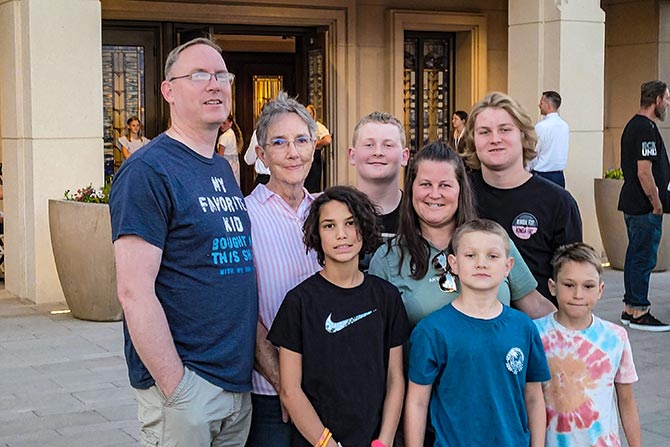
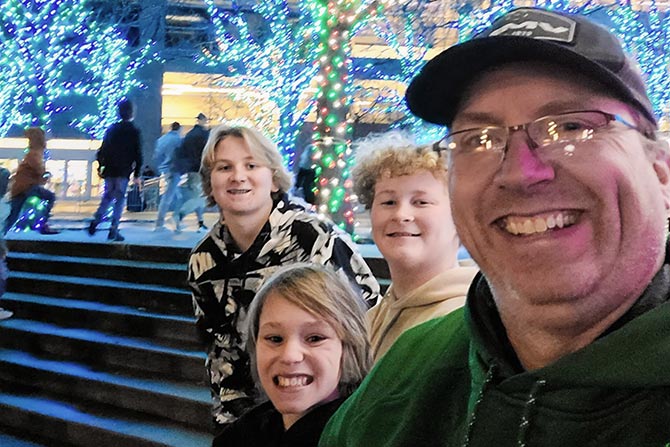
How did you get into the funeral industry?
I am a third-generation vault guy. My family was in the concrete burial vault business. We started with the Doric brand and ended with Trigard, which led to my dad being in the granite memorialization business in addition to vaults. I eventually went into the granite business, along with three of my brothers.
When I was young, I spent a lot of my time in cemeteries and funeral homes. I never really enjoyed funeral homes and always thought they were kind of creepy. I remember thinking that they smelled funny, that some of the funeral directors were quite strange and the buildings were all so dimly lit.
Many years later, there came a time when the granite business was slowing down, and I needed a Plan B. So, I reflected on why I enjoyed that business so much. It definitely wasn’t the heavy lifting. I did, however, enjoy the creative nature of the business — I was able to use the artistic talent and skills I had developed to create some beautiful memorial pieces.
It finally occurred to me that I loved hearing people’s stories — how people either wanted to be remembered or how they were going to remember their loved ones. Additionally, everyone has a unique story to tell. I thought the funeral business would be a perfect fit for me to continue being able to hear stories and help families along the way.
So, I enrolled in mortuary school all while continuing to run my business, helping my wife run her childcare business and keeping up with my growing children. It all worked out, and I have been blessed continually along the way. I continue to design and sell cemetery memorials and burial vaults — where my story began.
Any last thoughts?
Funeral service is really a great place to be. Yes, it is difficult, demanding at times and ever-changing. With all that in mind, it is a place where we truly have the opportunity to serve. We may get some bad press, but the media loves a bad story. Like with most things in American society today, the majority is silent, but they support what we do. We are doing good things. We help people both within the industry and in the communities we serve. Thank you to everyone who supports the funeral service and especially those who support this great association.
